

Ozymandias. A fair copy draft (c. 1817) of Shelley's "Ozymandias" in the collection of Oxford's Bodleian Library Ozymandias (in five syllables /ˌɒziˈmændiəs/ or four syllables /ˌɒziˈmændjəs/)[1] is a sonnet written by the English romantic poet Percy Bysshe Shelley (1792–1822).
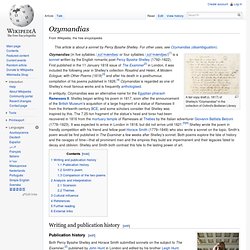
First published in the 11 January 1818 issue of The Examiner[2] in London, it was included the following year in Shelley's collection Rosalind and Helen, A Modern Eclogue; with Other Poems (1819)[3] and after his death in a posthumous compilation of his poems published in 1826.[4] Ozymandias is regarded as one of Shelley's most famous works and is frequently anthologised. Writing and publication history[edit] Publication history[edit] Smith's poem[edit] Comparison of the two poems[edit] Analysis and interpretation[edit] Scansion[edit] "Ozymandias" is a sonnet, written in iambic pentameter, but with an atypical rhyme scheme when compared to other English-language sonnets, and without the characteristic octave-and-sestet structure.
Dokkōdō. The "Dokkōdō" [ (Japanese: 独行道?)

; "The Path of Aloneness", "The Way to Go Forth Alone", or "The Way of Walking Alone"] is a short work written by Miyamoto Musashi (宮本 武蔵) a week before he died in 1645. It consists of either nineteen or twenty-one precepts; precepts 4 and 20 are omitted from the former version. "Dokkodo" was largely composed on the occasion of Musashi giving away his possessions in preparation for death, and was dedicated to his favorite disciple, Terao Magonojō (to whom the earlier Go rin no sho [The Book of Five Rings] had also been dedicated), who took them to heart.
"Dokkōdō" expresses a stringent, honest, and ascetic view of life. Desiderata. 1976 edition of The Desiderata of Happiness poetry collection "Desiderata" (Latin: "desired things") is a 1927 prose poem by American writer Max Ehrmann.
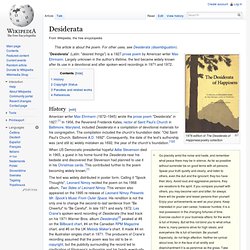
Largely unknown in the author's lifetime, the text became widely known after its use in a devotional and after spoken-word recordings in 1971 and 1972. History[edit] Go placidly amid the noise and haste, and remember what peace there may be in silence. As far as possible without surrender be on good terms with all persons.
Max Ehrmann, "Desiderata".[1] When US Democratic presidential hopeful Adlai Stevenson died in 1965, a guest in his home found the Desiderata near his bedside and discovered that Stevenson had planned to use it in his Christmas cards. Moon rabbit. The rover encountered operational difficulties after the first 14-day Lunar night, and was unable to move on the Lunar surface after the end of the second Lunar night, yet it is still gathering some useful data.
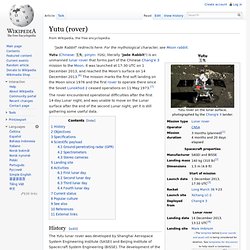
The Yutu lunar rover was developed by Shanghai Aerospace System Engineering Institute (SASEI) and Beijing Institute of Spacecraft System Engineering (BISSE). The development of the six-wheeled rover began in 2002 and was completed in May 2010.[8][9][10] It was designed to deploy from the lander and explore the lunar surface independently. The rover's name was selected in an online poll, and is a reference to the pet rabbit of Chang'e, the goddess of the Moon in Chinese mythology.[10] The official mission objective was to achieve China's first soft-landing and roving exploration on the Moon, as well as to demonstrate and develop key technologies for future missions.[11] The Chinese Lunar Exploration Program was divided into three main operational phases:[11]
The Juniper Tree (fairy tale) Marlinchen mourning the loss over her stepbrother whilst a bird emerges from the juniper tree The story contains themes of child abuse, murder, cannibalism and biblical symbolism and is one of the Brothers Grimm's darker and more mature fairy tales.
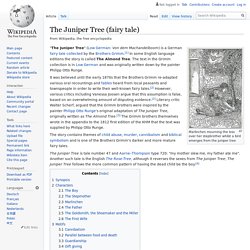
A wealthy and pious couple pray every day for God to grant them a child. One winter, under the juniper tree in the courtyard, the wife peels an apple. She cuts her finger and drops of blood fall onto the snow. This leads her to wish for a child to be as white as snow and as red as blood. Spoon River Anthology. Spoon River Anthology (1915), by Edgar Lee Masters, is a collection of short free-form poems that collectively narrates the epitaphs of the residents of Spoon River, a fictional small town named after the real Spoon River that ran near Masters' home town.
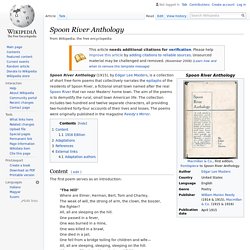
The aim of the poems is to demystify the rural, small town American life. The collection includes two hundred and twelve separate characters, all providing two-hundred forty-four accounts of their lives and losses. The poems were originally published in the magazine Reedy's Mirror. Content[edit] The first poem serves as an introduction: "The Hill" Where are Elmer, Herman, Bert, Tom and Charley, The weak of will, the strong of arm, the clown, the boozer, the fighter?
The subject of afterlife receives only the occasional brief mention, and even those seem to be contradictory. Spoon River Anthology is often used in second year characterization work in the Meisner technique of actor training. 1916 Edition[edit]